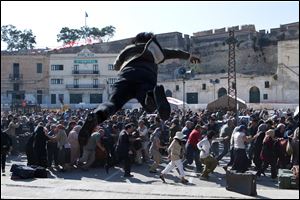
PEOPLE
Zombies’ place in pop culture appears to be on the fast track
Undead mirror real life in terms of impatience
6/24/2013
The infected scale the Israeli walls in 'World War Z.' The zombies race through the streets with the speed of a rushing stream and the agility of cats in the $200 million-plus Brad Pitt action-horror hybrid.
CHICAGO — The contemporary zombie is intensely networked, high-strung and on the move. Just go, go, go, 24-7.
Indeed, according to a 2012 study by the Pew Research Center’s Internet & American Life Project, people with prolonged exposure to this lifestyle will likely “thirst for instant gratification, settle on quick choices and lack patience.” University of Arizona and University of Pennsylvania marketing professors recently polled 800 callers to a help line who hung up after being put on hold; asked why they ended their calls, 34 percent said they got annoyed, hung up then called back immediately, expecting a different result.
And that’s just you and me — the living zombies.
In the past decade, the undead kind have attained a whole new level of impatience.
Exhibit A: World War Z, the new $200 million-plus Brad Pitt action-horror hybrid adapted from Max Brooks’ 2006 bestseller. In the book, wave after wave of the shuffling dead — referred to as “walking corpses,” “the Walking Plague,” etc. — are unquestionably just walking. They are classic archetypal zombies, which means, to an extent they were defined by a lack of dexterity and speed; they don’t overpower through strength or swiftness but unrelenting ubiquity. One of the novel’s most memorable, haunting images is of people around the globe simultaneously reporting corpses “walking out of the surf.”
In the movie? The undead race through streets with the speed of a rushing stream and the agility of cats.
Fast, in unison.
To zombie-philes, this is not a shock: “It’s become the eternal debate,” sighed Chad Savage, who runs Chicago Zombie, an all-zombies-all-the-time Web site. “Stones or Beatles? Fast zombies or slow zombies?”
On movie screens — at least since 2002’s 28 Days Later, when Cillian Murphy woke from a coma and found himself pursued through London by zippy zombie clergy — fast zombies have been gaining on the slow. The trend here is overwhelmingly walking dead who are in a hurry, must eat brains now and enter a triathlon. In fact, the World War Z film isn’t merely on trend; its zombies represent a notable increase in zombie velocity.
Said David Tarleton, a film editor and assistant professor at Columbia College: “The audience has grown so used to interpreting a lot of visual information quickly, rhythms within shots have sped up, lengths of edits have sped up, from maybe 7 seconds in the ‘40s to closer to 4 seconds now. The speed of zombies is probably a side effect — I had a student last semester who made a zombie movie and went with relatively fast zombies. Because it’s in the water now. We live in the fast zombie era.”
The slow-zombie contingent has history on its side.
Early movie zombies were creepers, sometimes hypnotized. In George A. Romero’s seminal 1968 film, Night of the Living Dead, a reporter asks a police officer: “Are they slow moving, chief?” And the cop replies: “Yeah, they’re dead.” The creators of AMC’s blockbuster series The Walking Dead — again, that word, “walking” — once posted online a handful of rules intended to govern the behavior of its zombies: They rejected all “sprinters” and insisted that the fastest its zombies should ever move is a “shambling run.”
But three seasons later, even they have shown signs of succumbing to fast-zombie lobbyists.
The future is in fast, running zombies — Zombieland zombies, Resident Evil zombies, armies of computer-generated zombies who don’t require the patience of make-up artists and are cheaper to employ.
Be thankful you’re not dead. Sounds exhausting.